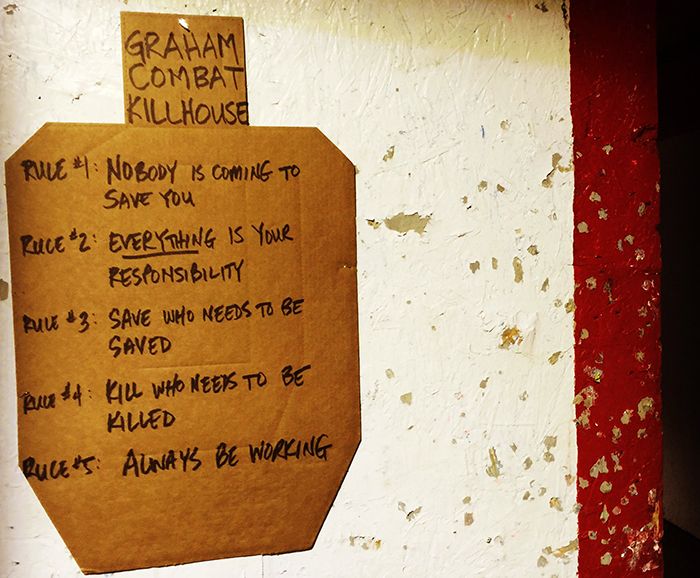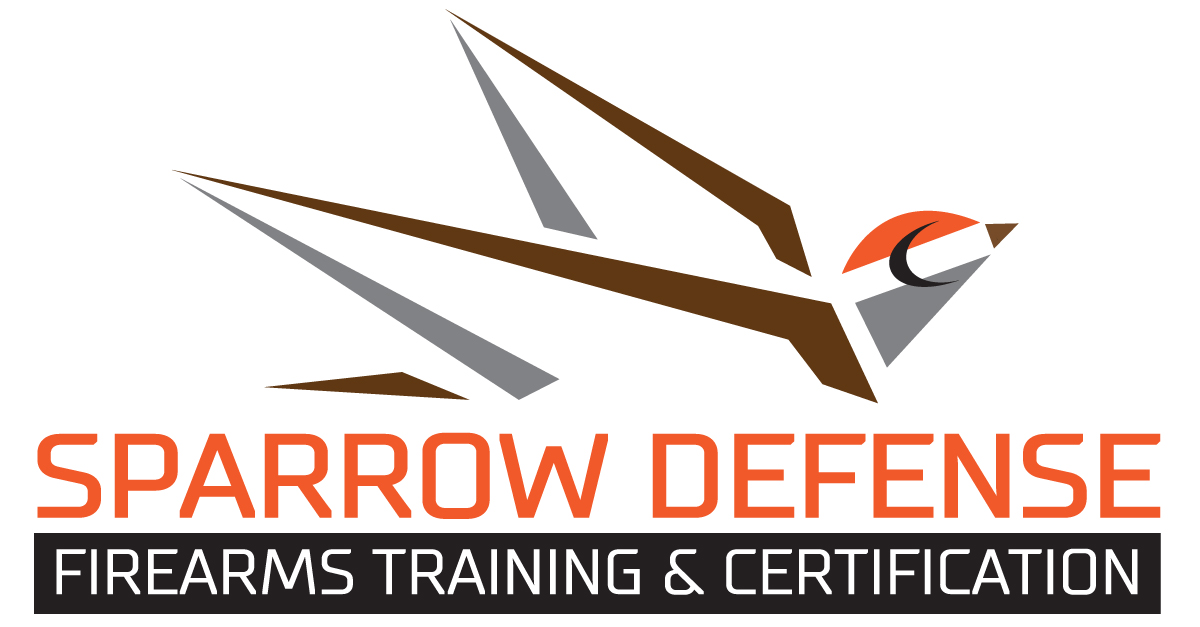
No One is Coming to Save You
"No One is Coming to Save You" is the first rule of Matt Graham's Killhouse class, and is one of the truest statements you can live by when it comes to personal safety. The Killhouse remains one of the best training opportunities I've ever had, and caused me to rethink a great deal of how I approached not only movement within a structure, but my everyday tactics and observational skills. Matt is an awesome instructor with an incredible knowledge base. I have always paid for my own training, and every mile driven and dollar spent on this class was worth it.
In 14 years of law enforcement, I had only a handful of chances to interact with violent felonies in progress. I've worked tens of thousands of calls, many of which involved property damage, physical violence, threats of violence, and gun/knife violence. I've responded to execution style murders, shootings, domestic disputes, robberies, incest rapes, and property disputes where grown adults acted like children. One person I arrested on a warrant had beaten his wife unconscious then disfigured her by pouring hot oil onto her face while she lay on the floor. Law Enforcement does generally try to end immediate violence to innocents when encountering it. With that said, it's rare that officers will arrive in time to do that. Consider that the average response time for law enforcement officers is usually upwards of 10 minutes under the best circumstances. Realistically, the event is over by the time cops arrive. In rare instances, I was able to have some sort of impact on the victim's circumstances.
However, my order of priorities were always:
- Arrive at the scene and secure it as safely as possible
- Halt immediate violence (if any)
- Detain any suspects
- Provide immediate relief and aid to victims
- Write a report for the permanent record
The television-style encounters are few and far between. In 2020, just before leaving law enforcement I responded to a call where the male was holding his girlfriend and her kids at gunpoint within the residence. The mother was in the process of moving out because the suspect was abusive. When he came home and discovered them in the act of packing the truck, he scared off the movers with a gun and then went inside to confront the victims. You'd think that the movers would have called 911 when confronted by a gun-waving and potentially violent individual. You'd be wrong; they left and never called anyone for help. The only reason we knew about it was that one of the children was able to send her grandmother a text. Upon arriving, we deployed around the house, called for more equipment, and developed an immediate action plan in case the situation devolved into shooting. During that time, the suspect left the room where the victims were located to see what we were doing and hide his gun. The victim locked the door, then lowered her kids to the ground out of a window and then jumped out herself. Once we got them to a safe location, we called the suspect out and took him into custody before clearing the home. My contribution was doing the report and writing down everything the suspect told his mama on the phone (which was a confession to at least four felonies).
So in that situation, who did more to alter the outcome of the victims? The answer is mom. Mom is the one who put her kids out the window. She then jumped out onto the sidewalk, landing on her face and sustaining injury. I was absolutely not about to charge into that house. Not because I'm a coward, but because my actions could have started violence by the suspect and could have increased the danger for the victims and the officers on scene. I didn't have enough information to work with, and breaching the house has a lot of legal and tactical implications. It's more complex than a 40 minute television episode makes it out to be. In many cases, even on SWAT calls, we would spend hours on scenes gathering information, making attempts to contact the suspect inside, negotiating, and not rushing in. SWAT generally does stand for Sit, Wait, and Talk.
Additionally, I have worked with individuals who have frozen and refused to act. One of those individuals failed to engage a threat pointing a gun at him across a bed. That officer had to be pushed out of the way by the supervisor on scene, who did engage and shoot the suspect. Later, the officer who failed to act left his employment with my agency and moved to.... Broward County, Florida to become a Captain over... a School Resource Officer program. It's an unspoken custom in many places (not all) that officers who fail to perform in a satisfactory manner on patrol get moved to Courthouse or School details. The people protecting our most visible institutions of government (schools, courts, jails) are often the least trained members of that particular law enforcement community.
The Supreme Court has affirmed multiple times that the Government (social workers, police, DFACS, etc.) do not have an OBLIGATION to save you. Cops, Firemen, Paramedics, and government officials in general are not required to sustain injury or put themselves at risk to better your outcome. Let's just check out Florida for a moment:
- Broward County Man Fends off Break-in
- Stoneman Douglas High School Shooting
- Pulse Nightclub Shooting
Here's some case law (if you don't speak the language of the law, it's time to learn):
- Castle Rock v. Gonzales
- DeShaney v. Winnebago County Department of Social Services
- City of Rome v Jordan
- Feise v Cherokee County
Now let's talk about your Employer and Private Property. The unpleasant reality of the situation is that your employer, with rare exceptions, doesn't care about your death. Let that sink in. This morning, FedEx has issued a "Thoughts and Prayers" style message in reference to the murder of 8 employees in Indianapolis. It's very similar to the message they put out in 2014 when there was a shooting at the FedEx hub in Kennesaw, Georgia. That said, FedEx has a workplace policy that strictly prohibits the carrying of firearms or weapons by employees. FedEx even prohibits employees from having a weapon in their personal vehicle parked on company property, and has fired individuals for that (Stewart, T. v. Fedex Express).
Many of my friends and students work for employers who show a casual disdain for their safety.
- The local hospitals have no-gun policies, but put employee parking areas in dark, unsecure locations in high-crime areas with no security presence
- Gas stations such as QuikTrip and RaceTrac have no-gun policies, in spite of the risk of criminal acts against staff (including a recent murder of a store employee)
- Georgia law provides for properly trained school personnel to carry firearms on school grounds, yet almost no school districts have adopted firearms carry by staff
- UPS / FedEx / USPS does not allow their drivers or employees to carry weapons for defense
- The University System of Georgia prohibits employees and staff from carrying firearms, even though visitors and students may do so
- Home Depot, Lowe's, and WalMart all have no firearms or weapons policies for staff, including Loss Prevention staff who confront individuals involved in crime before the police arrive
- Food delivery employees are generally prohibited from carrying weapons or pepper spray for self-defense
- Grocery stores generally prohibit firearms carry by employees
So why these policies? It's because you're more of a financial risk to your employer as an armed individual who defends yourself from attack than you are as a corpse. If you are attacked at work, your employer has very little risk of being successfully sued by you based on the actions of a criminal who does you harm. However, should you defend yourself with violence and do injury to the suspect, that changes. The criminal will sue you personally, but also your employer (the deep pockets). In those cases, the business now needs to defend itself in a civil court and will most likely end up settling to avoid the publicity and cost involved in a civil proceeding. Their immediate defense is generally that you were acting outside their control and violating their "No Weapons" policy, which hopefully gets them off the hook of the lawsuit. They'll also terminate your employment as an added bonus for winning a fight someone else started.
The point of this Blog is to remind you that calling 911 doesn't solve your problems. People do. In many cases, you're going to need to solve it yourself. You can't count on your employer. You can't count on law enforcement. You can't count on your neighbor because he/she is busy filming the fight you're in for social media. You can't count on Good Samaritans, because they don't want to get involved or get sued.
You need to count on yourself.
For those of you who work in a non-permissive environment, just remember that (at least in Georgia), there is a difference between violating your workplace policy and violating state law. If you're going armed against your policy, but are in compliance with the law, you aren't doing anything wrong from a criminal perspective. Yes, your employer can terminate you or take action against your employment. However, any place that requires me to sacrifice my personal safety as a condition of employment is nowhere that I want to work.
